Al Hussain’s martyrdom is considered one of the most tragic and despicable events in Islamic history. He was slaughtered in the land of Karbala with seventy-two of his family members and loyal companions by the first hereditary transfer of leadership in the history of Islam. Muawiya, the son of Abī Sufyān, appointed his son Yazid as the next Caliph1 of the Islamic world without a consultation to any of the major Islamic figures at that time. He expected total submission and sworn allegiance to his son by all Muslims throughout Iraq, Egypt, Hijaz (Arabian peninsula), and Persia. This compulsory allegiance, however, resulted in a series of oppositions around the Islamic states. The most significant opposition was from the leader of Prophet Muhammed’s household at that time, Immam Hussain, the son of Ali the son of Abu Talib.2 His opposition to Yazid’s ruling resulted in the Battle of Karbala, which is a battle that has been influential throughout Islamic history up to our current time.
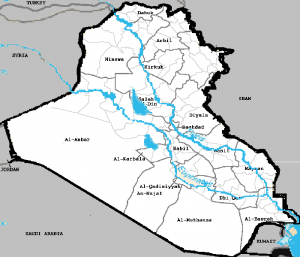
Karbala, a city in central Iraq sixty-two miles southwest of Baghdad the Iraqi capital, is where the famous battle occurred.3 Yazid’s army was led by Omar Ibn Saad, and was estimated to be numbered from 4,000 to 20,000 fighters, ranging from horsemen, bowmen, and infantry. For Hussain’s army, the number ranged from sixty-two to eighty-two soldiers, about twenty of them being from his household and the rest were his companions. The reason Yazid accumulate all those numbers was only for one purpose: to bend Hussain’s ethical standards and values by accepting him as Caliph.4
Before the death of Caliph Muawiya Ibn Abī Sufyān, he designated in his will for Yazid to be his successor as a caliph to the Islamic world, leaving no room for discussion. Direct assignment of Yazid by his father was a first of its kind in the Islamic world. This was considered a violation of the concept of Shura (consultation between Muslims), and a violation of the condition of having a good moral character for a caliph. By selecting his son, Muawiya created the first ruling dynasty in the Islamic nation, the Umayyad dynasty. Before Yazid, there had been four successor caliphs who were acknowledged to be Prophet Muhammed’s successor: Abu Baker, Omar the son of Khatab, Uthman the son of Affan, and Ali the son of Abu Talib. Each caliph had his unique method of selection. However, it was unprecedent for a father to appoint his ill-qualified son without consulting the major Muslim figures.5 To examine how different Yazid’s appointment was, we need to go back to about fifty years before Muawiya’s death. We need to go back to the day of Saqifah.
The day that the first caliph, Abu Baker, was appointed as caliph is known as the day of Saqifah. This is because the attendees who swore allegiance to Abu Baker gathered in a place called Saqifah (Shelter) of the Bani Saaida tribe. His designation as a caliph was a result of a swift agreement that was reached in the Saqifah between some of the Muslim immigrants from Mecca, known as Muhajirun, and some of the Muslims of Madinah, who provided protection for Muslims after they fled Mecca, known as Ansar. After a dispute over who should be the the Caliph-Successor of Prophet Muhammed, they finally agreed that a successor to the Prophet should be from the people who were closest to him, the Muhajirun. This argument was supported by the fact that Prophet Muhammed himself was from the Muhajirun. Thus, the Muhajiruns and their descendants should continue to rule the Islamic nation, and the Ansar should continue supporting the Islamic nation without being involved directly in the leadership. Before they reached this conclusion, the Ansar elected a man named Sa’d bin Ubadah, the leader of the Khazraj tribe. Khazraj was one of two major tribes who supported Prophet Muhammed and Muslim immigrants when they came to Madinah. The other major tribe was the Aws. However, their leader did not have a claim to the succession of Prophet Muhammed. Some from the Ansar suggested that Muslims should have two leaders: one from Ansar, and another from Muhajirun. However, Abu Baker rejected that idea and suggested that the leadership should be given to Muhajirun, and the ministry should be given to Ansar. For the leadership, he nominated Omar, the son of Khatab, or Abu Ubayda bin Al Jarrah. However, both declined the nomination and endorsed Abu Baker to be the caliph, as they claimed that the Prophet himself gave his preference to Abu Baker when he was sick.
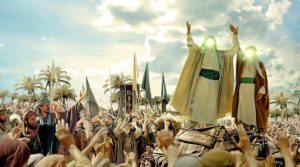
The majority of people in the Saqifah agreed to this nomination, and they started to give their allegiance to Abu Baker. However, some of Ansar shouted that they would only give their allegiance to Ali, the son of Abu Talib, the Prophet’s cousin. The reason they did that was because it has been reported that the Prophet himself appointed Ali in his last sermons before passing away. However, the people of Saqifah acted as if there was no appointment given.6 The voices who were asking for Ali were silenced by the threat of the sword, and Abu Baker continued his rule for about two years.7
Omar was recommended by Abu Baker to be the next caliph after consulting with a few of his close companions. He was the first person to be directly selected with little to no consultation with Prophet Muhammed’s closest companions. When some of the companions objected to Abu Baker’s selection of Omar, due to his tactless behavior and uncompassionate heart, Abu Baker defended his selection, on the grounds that he did not select a family member so as to avoid being accused of having ill-intentions. What Abu Baker was trying to show was that his selection was not emotional and that his choice of Omar was sincere and was based on the belief that he was the most suitable choice to lead Muslims at that time. After his appointment, Omar ruled as a caliph for ten and a half years.8
For Uthman, he was selected among six men who had been selected by Omar before his death. Omar nominated these men to be eligible as a caliph. They were Uthman Ibn Affan (from Umayyad tribe), Ali Ibn Talib (the Prophet cousin), Abd Al-Rahman bin Awf, Saad Ibn Abi Waqqas, Al-Zubayr bin Al-Awwam, and Talhat Ibn Ubaydallah. Omar commanded that any in the council who did not agree with the majority’s selection of a caliph should be killed to eliminate any disagreement. In case of a tie, where three people agreed on one person and three agreed on another, their should be someone to break the tie. For that, he selected Abd Al-Rahman bin Awf—the same person in the council—to be the final judge. The voting was split between Ali and Uthman. To break that tie, Ibn Awf asked one question: “will you indeed act in accordance with God’s Book, the practice of His Messenger and the example of the two caliphs after him?”9 Ali partially agreed to the condition, which was to rule in accordance with the Quran and the practice of the Prophet. However, he rejected to follow the tradition of the first and second Caliphs, Abu Baker and Omar. He replied that he would rule based on the best of his knowledge. On the other hand, Uthman agreed to follow Abu Baker and Omar as examples as caliphs. Thus, Ibn Awf voted for Uthman. As a result, Uthman became the third caliph of Prophet Muhammed.10
Uthman’s rule lasted about twelve years. In his time, there were three major things to note. The Ummayaad tribe’s authority in the Islamic world start to grow, as Uthman distributed the state’s financial gains unequally, giving the majority of those gains to the Ummayaad tribe. Also, he appointed his relatives to different government positions. One example is the appointment of his half brother Al Walid ibn Uqba to Kufah Iraq, as well as an appointment for his cousin Abdallah Ibn Kurayz. This led loyal companions, such as Abu Dharr Al-Ghifari, to object to such administrative corruption, but they were then recalled from Syria back to Medina, to be under Uthman’s watch.11 Eventually, he was sent to the desert, to a place called Al-Rabatha, where he died there, alone. Uthman’s policies led Muslims around the states to revolt. They asked Uthman to step down. However, Uthman did not respond to these request, which led the revolt to invade his house and kill him. Uthman’s death created a power vacuum, which left the Muslim world without a caliph.12
After the death of Uthman, the Muslims in Madinah and the rebels urged Ali Bin Abi Talib to accept the position of the Caliph. Ali asked for two conditions for a legitimate oath of allegiance. One, to be publicly announced among Muslims. Two, that the allegiance has to be given in the Masjed (mosque). These two conditions of Ali called into question the legitimacy of all previous caliphs’ oaths of allegiances. For Abu Baker, the matter was not shared publicly among the Muslims. It was privately discussed among a group of people, not the public. For Omar, he was directly appointed by Abu Baker without consultation. For Uthman, Omar put a condition to kill whomever disagreed with the vote of the majority among the voting council. Thus, Ali was attempting to create a standard that had been compromised since the death of the Prophet.
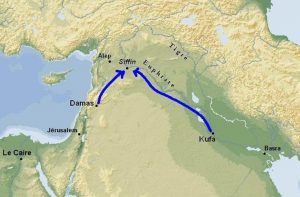
Ali ruled for five years. During that time, Ali had to fight three major battles: the Battles of Siffin with Muawiya, of the Camel with (Aisha the daughter of Abu Baker and the Prophet widow, Talha, and Zubair), and of Nahrawan with the Kharijites. In Siffin, Muawiya waged a war against Ali. He did that in the name of avenging Uthman’s death. He claimed that Ali was reluctant to prosecute the killers. Muawiya and Uthman belonged to the same tribe. Thus, he took advantage of Uthman’s death to seek political gain and area expansion.
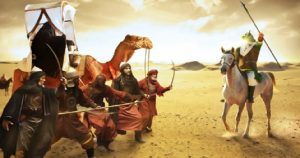
In the battle of Camel, Aisha, the widow of prophet Muhammed, was also seeking to avenge Uthman. For Talha and Zubair, even though they were two of the early people to give allegiance to Ali, they were upset because Ali did not appoint them to any leadership positions. For Zubair he wanted to be the governor of Iraq, and Talha wanted to be the governor of Yemen. Thus, they felt underappreciated by Ali for not giving them the positions that they thought they were worthy of. Thus, they aligned with Aisha to bring Ali’s government down.13
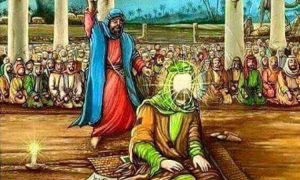
At the end of his rule, Ali was assassinated by Abd Al-Rahman ibn Muljam in 660. After fighting three civil wars with major Islamic figures, Ibn Muljam perceived Ali to be the main reason that Muslims were suffering. Thus, he took an oath to end Ali’s life, and he fulfilled his oath.14
After Ali’s assassination, Muslims of Iraq sworn allegiance to Ali’s elder son, Al-Hasan. Al- Hassan chose to seek peace with Muawiya, signing a truce with Muawiya. The most important condition of the truce was that if Muawiya died, then Al-Hasan would succeed him. Also, Muawiya should not appoint a successor after him; he should leave this matter to Shura (consultation) among Muslims.15 However, ten years after signing the treaty, Muawiya conspired with Al-Hassan’s wife Ja’dah, daughter of al-Ash’ath ibn-Qays Al-Kindi, to poison Al-Hassan. The plot was accomplished successfully, which led to Al- Hassan’s death. In addition to paying her 100,000 Umayyad Dirhams ($362,998), Muawiya promised Ja’dah that she would marry his son Yazid as a reward. Ja’dah was payed the financial reward, but Muawiya did not allow her to be his son’s wife.16 Six years after of the death of Al-Hassan, Muawiya revoked the treaty and appointed his son as his successor without any consultation. This appointment created anger among the Islamic figures, as Yazid was known for his immaturity and impiety.17
What resulted from this was the supporters of Ali in Iraq began communicating with Hussain, requesting him to be their Caliph. They sent him letters, many letter, asking him to come to lead them. They held him responsible as the Prophet’s grandson to defend Muslims from the oppression of the Umayyad Caliph, Yazid. Hussain had to react to save the nation of his grandfather’s from injustice, and to clear his responsibility in front of Allah. Some people advised him not to leave Madinah and rather seek refugee next to the tomb of his grandfather. He did not stay because he knew that they would violate the sacredness of Madinah and kill him. He was asked to give allegiance to the newly appointed Caliph Yazid. He refused. Hussain said,
“O Amir! We are members of the household of the Prophet, the substance of the [Divine] Message, and the ones visited by the angels. Allah initiates by us, and so does he conclude. Yazid is a wine drinker, a killer of the prohibitive soul, a man who commits sins in the open. A man like me does not swear the oath of allegiance to a man like him, but we will see the morning, and so will you; we shall see and so will you as to who among us is more worthy of the caliphate.”18
The governor of Madinah was infuriated by his excessive pride and straightforward answer. He wanted to kill him because of his disobedience. When Yazid sent a letter to his governor, he specifically named Hussain as one of the people that should swear allegiance to him. However, Hussain was prepared for such a challenge, and had men of Bani Hashim ready for a plot to resist a possible attempt of assassination by the governor. The Governor of Madinah did not have enough manpower nor the willingness to be involved in the killing of the grandson of the Prophet. For Hussain, he did not want to disrupt the peace of Madinah, as it is a location of sanctuary from war and bloodshed. Also, the timing of political dispute was coinciding with the month of Thul Hija, which is the month were the Muslims perform the ritual of Hajj. Thus, neither the location, nor the timing was suitable for war in the holy land and during the holy month. Hussain gathered his family members and his supporters and left Madinah, saying the last goodbyes to his grandfather’s tomb and to his place of origin. He left Madinah to face his destiny with very little support from the Islamic figures of that time.18
Before departing from Madinah to Mecca, four influential figures tried to persuade Hussain not to go to Iraq. Two of them were his brother Omar Al-Atraf and Muhammed Ibn Al-Hanafiyya, one of prophet Muhammed’s wives Um Salmah, and the son of the second Caliph Abdullah, the son of Omar the son of Khatab. For Al-Atraf, he assured Husssain that he was marching to his death, and that it would be better for him to give allegiance to Yazid to protect his life. For Ibn-Hanafiyya, he suggested that Hussain should flea Madinah, and travel from a state to another looking for more supporters and to avoid any conflict with Yazid’s statesmen. He also added, if Hussain could gather more supporters, then he could continue his opposition against Yazid. If not, he should accept the situation and accept Yazid as the Caliph of the Islamic world. For Umm- Salamah, she shared a narration from Prophet Muhammed, reassuring that Hussain would die in Iraq, in a land called Karbala. For that, she was trying to keep Hussain from going to Iraq. For the son of Omar, he advised him not to leave Madinah, but to stay in it to seek refugee. For Hussain, he declined all these recommendations, and although he might be marching to his death, for him what matter was defending the religion of Islam from deviations from its core values. Before leaving Madinah, in his will, he said:
“I did not march out exultingly, nor recklessly, nor seeking to make corruption in the land, nor to oppress anyone. Rather, I marched out seeking to reform my grandfather’s nation. I desire to enjoin what is right and to forbid what is wrong and to follow the Sunnah of my grandfather and of my father ‘Ali Ibn Abi Talib. So, whoever accepts me an acceptance of righteousness, Allah is the Master of what is right, and whoever refuses, I shall persevere till Allah judges between me and the people; surely He is the best of judges.”20
After uttering his last words in Madinah, Hussain left to Mecca to perform Umrah. In Mecca, a couple of people tried to have him change his mind from going to Kufah, Iraq. However, one person encouraged him to leave Mecca and fight in Iraq, Abdullah the son of Zubair. For Ibn Zubair, he urged Hussain to fight Yazid and leave Mecca to accomplish his mission. Ibn Al Zubair did not feel comfortable with Hussain in Mecca. He wanted Mecca for himself. However, if Hussain stayed in Mecca, Ibn Al- Zubair would not stand a chance in being the governor of Mecca. Thus, he did all that he could to push Hussain out. Hussain did not pay much attention to Al-Zubair’s political ambitions, as he was determined to go and face his destiny.21
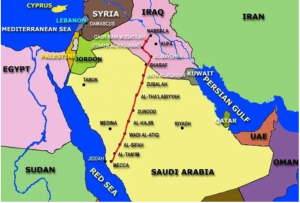
On September 22, 680 CE, Hussain (62 years old) left Mecca with his sons, daughter, wives, sister Zainab (55 years old), his brother and closest ally Abbas (34 years old) and his other three brothers, the son of his brother, Al- Qasim son of Hassan (15 years old), and the infant of Hussain, Abdullah, with a few of Prophet Muhammed’s companions, Ali’s companions, and Hassan companions. Also, there were sixteen free slaves who joined the cause of Imam Hussain. Some men and women joined Hussain from Mecca, and some joined him on his way to Iraq. One of those who joined Hussain before reaching Iraq was Wahab Bin Abdullah Al-Kalabi, his mother, and his newly married wife. Wahab was a Christian man who converted to Islam after meeting with Imam Hussain. His mother urged him to join the cause of Imam Hussain, and advised him not to leave the son of the Prophet alone. When they met with Yazid’s army, Wahab was one of the first people to lose their life. His head was cut off and thrown back at the army of Hussain. This had infuriated his mother, which led her to hold a wooden log and fight back. She was able to kill two soldiers from Yazid’s army before Hussain had her returned to her tent, as she was told that as a woman she was not allowed to fight. For Wahab’s wife, while she was wiping the blood of Wahab’s beard, she continued forward to the battlefield. She was able to kill two soldiers before she was killed. She was the first woman to be killed in Hussain’s camp.22
When Hussain reached the land called Karbala, he was met with the army of Omar bin Saad, which was to stop Hussain’s advancement toward Kuffah, which was about 57 miles away from Karbala. On the other hand, Ubayd Allah ibn Ziyad, the governer of Kufah, jailed, killed, and spread threats and fears to everybody who wanted to Join Hussain’s camp. Also, he besieged the city where it was difficult for Hussain’s allies to leave Kufah. And if they were successful in breaking the siege, they were followed and killed before reaching to Karbala. Thus, Hussain’s camp’s numbers did not grow much. Also, financial incentives were offered to tribes who would switch sides from Hussain to become Yazid’s supporters. The army leaders, such as Omar Bin Saad, were promised a governor’s position in different areas in the Islamic world. Thus, there was little to no materialistic gain to be had on Hussain’s side. Additionally, before starting the battle, Hussain informed his companions that they would probably all die, and that all of them were free to leave his army if they saw fit. Thus, any person who was expecting a political and financial gain left Hussain’s camp. The numbers of Hussain’s camp continued to decline. Only few people who had faith in him and in his path remained in his camp.23 In response to that, Hussain said: “People are the slaves of the world and their religion is superficial, only on their tongues. They are attentive to it as long as their material benefits are provided, but when they are tested, the number of true devotees dwindles.”24
Before Omar Ibn Saad came to Karbala, Ibn Ziyad sent a letter to Hussain asking him to swear allegiance to Yazid. However, Hussain ignored the message and left the messenger unanswered. This action infuriated Ibn Ziyad, which led him to tell Ibn Saad to march to Karbala with 4,000 soldiers. From the 2nd to the 7th of Muharram, Ibn Saad continued negotiating with Hussain.25 Ibn Saad wanted to avoid a confrontation with Hussain, to avoid being labeled as the killer of the Prophet’s grandson. After reaching a dead-end in the negotiations, Ibn Ziyad commanded Ibn Saad to prohibit Hussain from drinking water. Ibn Saad placed 5,000 soldiers in the Euphrates river shoreline. On Muharram 7, three days before the battle, Hussain’s camp ran out of water. Children and women were screaming out of thirst. This led Hussain’s brother Abbas to ask permission to break the siege. Thus, he asked permission from Hussain to bring water and his request was granted. Abbas was a very skilled warrior, and he was able to break the siege and fill some water and head back to the camp. However, when he served the water to the children, they were all rushing to get water. For that they could not control themselves and the water was spelled on the ground and nobody was able to drink any water.26
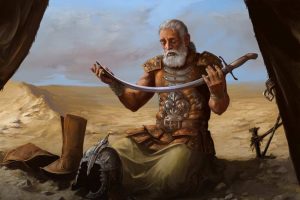
Before running out of water, Hussain had an abundant water supply to sustain him and his whole camp for days after the battle. However, he met with a group of soldiers who belonged to Yazid. They were led by Al-Hur ibn Yazid Al-Riyahi. He ran into Hussain in the middle of the desert with his soldiers. Al-Hur and his soldiers were in extreme thirst. However, the only person who had water was Hussain. Al-Hur’s mission was to halt Hussain and stop him from advancing until Ibn Saad had come. Hussain saw the situation of Al Hur and his soldiers and decided to provide water for them and their horses. This tremendously exhausted Hussain’s water supply. Hur’s army was estimated to be about a 1,000 soldiers. After Hur and his soldiers satisfied their thirst, they continued their mission and halted Hussain in the land of Karbala. When the battle started and Hussain called for support, Hur regretted what he had done. He regretted halting Hussain at Karbala. He fled to Hussain’s camp and asked for forgiveness. Hussain accepted him and never blamed him for what he did. After that, he participated in the battle as Hussain’s companion. He fought honorably and died with honor in the land of Karbala.27
After the thirsty children of Hussain camp spilled the water, Abbas asked to go for another campaign to bring water. Hussain granted his request. Abbas went again to break the siege. He was able to break it. Abbas himself was thirsty too. When he was on the river, he cooled his hands in the water. He grabbed some water, and he was about to drink it. Then, it was reported that Abbas dropped the water and did not drink any. Abbas refusal to drink water was an act of loyalty to his brother Hussain, as he refused to drink water while his brother was thirsty. Abbas rode back to Hussain’s camp to quench the crying children’s and women’s thirst. However, on his way back, he faced a massive resistance. They cut his right arm, and he kept moving forward. They cut his left arm, and he kept moving forward. When he lost both arms, he clinched the water bag by his mouth and continued moving forward. The enemy then realized that Abbas only cared about the water bag. Thus, they start shooting arrows at the bag until it was penetrated.
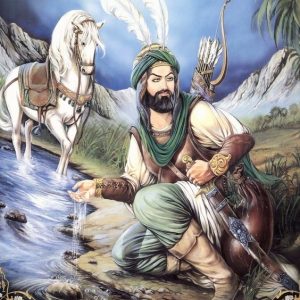
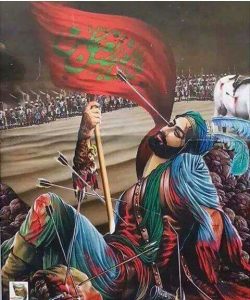
The water start pouring out of the bag. Abbas tried to contain the water that was pouring on the ground. However, he had no hand to preserve the water. After that, a man shot him in his eye. He tried grip the arrow in between his legs to remove it. While he was doing that, another man hit him on the back of his head with a steel pipe. After that, Hussain was able to go through the enemy to mourn his brother. When he reached Abbas, he uttered these words “Now my spine has been split and my endeavour is further weakened.”28 After that, he went back to his camp to protect those left of the women and children.
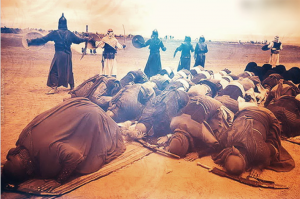
Abbas was the last soldier of Hussain to be killed before him. Before that, all his companions, sons, nephews, free slaves, and some women were killed in the battle field. Some died while standing during Noon Prayer time. Even though Hussain was in a very hostile environment, he continued practicing his religious practice at the most difficult time. As a result of that, a number of his companions were shot while protecting the worshipers. After that, one group after another starting heading to the battlefield to face their imminent destiny, death.
When Hussain reached the tent, his infant son, Abdullah, was crying loudly. He was thirsty. His mother, Al- al-Rubab and his sister Zainab brought Abdullah to Hussain. He kept kissing the baby to say his last goodbyes. Then, he went to Ibn Saad’s army and start asking for water for the infant. This incident created a dispute among Ibn Saad’s camp. Some asked to give the infant some water, and some rejected. While they were arguing, an arrow was shot. It settled on the neck of Abdullah the infant. Harmalah Ibn Kahil al-Asadi decided to shoot the child to end the camp’s dispute. Instead of receiving water, the infant was soaked in his own blood. This tragedy broke Hussain’s heart and all who were left, of the females and children in the camp. After that, Hussain started heading to the battlefield for his final fight. First, he challenged the enemy warriors in one-on-one fight. After killing a number of them, Ibn Saad was furious and he shouted at his army that Hussain was no ordinary fighter. Thus, he ordered his army to attack from all directions. They shot at him approximately four- thousands arrows to force him off his horse. Ibn Saad’s soldiers started attacking the women and children in the camp, to disturb Hussain while fighting. As he was fighting, his thirst continued to increase. He was able to break into the river. He offered his horse some water. When he was about to drink some, men from Ibn Saad’s army shouted “Do you enjoy water while the sanctity of your women has been violated?”29 Hussain dropped the water and rushed to his women’s tents. When he reached to the tents, Zainab and the rest of the females gathered around to say their last goodbyes. Hussain advised them to be patient and be ready for the trouble they were going to face after his death. Then, he left to the battlefield. The children were mourning, holding his clothes, and begging him not to leave. His daughter, Sukayna (14 years old), was very attached to her father. She was crying loudly in tears for her father not to leave. Hussain tried to calm her down. While he was doing that, Ibn Saad commanded his bowmen to shoot their arrows at Hussain, since he was busy with his family. They shot their arrows. Some of the arrows hit some of the women near Hussain. After that, the women rushed into their tents. Hussain moved forward for his fight. He attacked them fiercely. While he was fighting, the men of Ibn Saad kept provoking Hussain about the water, telling him that he would never taste a drop of water. After that, Hussain shouted and said, “O nation of evil! It is, indeed, evil the way how you succeeded Muhammad (S) in faring with his ‘progeny! You shall not kill anyone after me and contemplate on the consequences of killing him; rather, you will think very lightly of it once you have killed me. By Allah! I hope that Allah will grant me the honour of martyrdom then will He seek revenge on my behalf from whence you know not.” Al Husayn Ibn Numair ,who was a commander in Ibn Saad camp, replied to this and said “And how will He seek revenge on our behalf on you, O son of Fatima?” and Hussain answered back “He will cause you all to kill one another and thus get your blood spilled, then shall He pour His torment upon you in the most painful manner.”30 Then, the army of Ibn Saad continued to finish their job, with one person throwing stones on Hussain’s forehead, another shooting an arrow, and another poking Hussain with a spear. At the end, Hussain had fallen to the ground. However, nobody was sure of his death. While he was falling, Hussain said “Lord! You know that they are killing a man besides whom there is no other son of Your Prophet’s daughter!”29 It was mentioned that Hussain had 360 wounds, 30 hit, and the arrows on his shield were like hedgehog hair. After that, Ibn Saad soldiers kept causing different injuries to make him suffer more in his death. One man shot an arrow to his throat, another injured his shoulder, and another hit him with his sword at the back of his head. Then, Ibn Saad shouted at his men to end Hussain and separate his head from his torso. Two men advanced; their names were Sinan bin Anas Al- Nakah’i and Shamir Ibn Al-Jawshan; they moved forward and stepped over his chest. Sinan said, “I will decapitate your head, and I know that you are the son of the Prophet and the best of people father and mother. “32 Then Shamir said, “I am killing you today with certain knowledge, there being no doubt in it, nor any chance, nor discretion, that your father is best of the ones who spoke.”33 After that, Shamir commanded Sinan to cut his head, but he did not want to do it. Shamir got angry and he hit Hussain twenty times on his head, he grabbed Hussain from his beard, and decapitated Hussain’s head.33
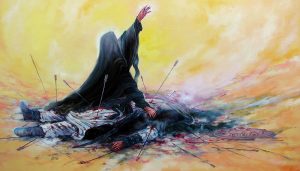
While Hussain was being killed, his sister Zainab was observing from the top of the hill. When Zainab saw that her brother had been killed, she rushed to her brother’s body, bursting into tears, and complaining to Allah for what the Islamic nation had done to her brother. They killed him in the worst way possible. Even after his death, they brought the horses to step over his body to break his bones. And then, they kept looting his belonging, such as his ring or anything they thought valuable. They were all competing on who would tell Yazid that they hurt Hussain the most. One was bragging about shooting him with an arrow, another breaking his bones, another cutting his head off, and another about burning the women’s tents. It was all to get Yazid’s highest rewards.35
Hussain’s story is still remembered around the world. His memorial is celebrated in almost every country. It is celebrated to remember the person who refused to give in to his oppressor. He refused to give up his values, his faith, and his prayers in the most difficult time. People usually find some excuses to justify their wrong doing. However, for Hussain, even losing his infant in the most horrific way did not compromise who he was. In his story, we learn that the end does not justify the means. He chose to lose his children, home, and companions. But, he did not accept to lose who he was and what he stood for, despite the grave and painful loses.
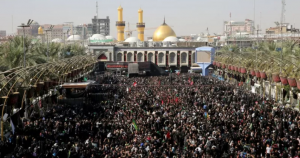
- The term Caliph means deputy. When a person hold the position of a caliph, it means that he hold the responsibility of Prophet Muhammed toward the Islamic nation. ↵
- Son and Ibn are used interchangeably in this article. Ibn is an Arabic word that means the son of. ↵
- Diana Steigerwald, “Karbala,” in Encyclopedia of Islam and the Muslim World, ed. Richard C. Martin, 2nd ed., vol. 1 (Farmington Hills, MI: Gale, 2016), 607–8. ↵
- Richard Kroes, “Karbala: A Battle Revisited,” Medieval Warfare 6, no. 2 (2016): 33–38. ↵
- Tabaråi, “Why Mu’awiyah Made His Son, Yazid, Heir Apparent,” in The History of Al-Tabari Vol. 18 : Between Civil Wars: The Caliphate of Mu’awiyah A.D. 661-680/A.H. 40-60, trans. Michael G. Morony, SUNY Series in Near Eastern Studies (Albany: SUNY Press, 1987), 173–189. ↵
- “Sahih Muslim 2404a and 2408 – The Book of the Merits of the Companions – كتاب فضائل الصحابة رضى الله تعالى عنهم – Sunnah.Com – Sayings and Teachings of Prophet Muhammad (صلى الله عليه و سلم),” accessed April 28, 2022, https://sunnah.com/muslim:2404a; “Sahih Muslim 2408a – The Book of the Merits of the Companions – كتاب فضائل الصحابة رضى الله تعالى عنهم – Sunnah.Com – Sayings and Teachings of Prophet Muhammad (صلى الله عليه و سلم),” accessed May 2, 2022, https://sunnah.com/muslim:2408a. ↵
- Tabaråi, “An Account of the Saqifah,” in The History of Al-Tabari Vol. 9 : The Last Years of the Prophet: The Formation of the State A.D. 630-632/A.H. 8-11, trans. Isåmaáåil Qurbåan Husayn, SUNY Series in Near Eastern Studies (Albany: SUNY Press, 1988), 189–205. ↵
- Tabaråi, “His Appointment of ’Umar b. al-Khattab as His Successor,” in History of Al-Tabari Vol. 11, The : The Challenge to the Empires A.D. 633-635/A.H. 12-13, trans. Khalid Yahya Blankinship, SUNY Series in Near Eastern Studies (Albany: SUNY Press, 1993), 145–153. ↵
- Tabaråi, “The Account of the Electoral Council,” in The History of Al-Tabari Vol. 14 : The Conquest of Iran A.D. 641-643/A.H. 21-23, trans. Rex SMith, SUNY Series in Near Eastern Studies (Albany: SUNY Press, 1994), 160. ↵
- Tabaråi, “The Account of the Electoral Council,” in The History of Al-Tabari Vol. 14 : The Conquest of Iran A.D. 641-643/A.H. 21-23, trans. Rex SMith, SUNY Series in Near Eastern Studies (Albany: SUNY Press, 1994), 143–163. ↵
- Tabaråi, “The Events of the Year 29 (September 14, 649 – September 3, 650),” in The History of Al-Tabari Vol. 15 : The Crisis of the Early Caliphate: The Reign of ’Uthman A.D. 644-656/A.H. 24-35, trans. R. Stephen Humphreys, SUNY Series in Near Eastern Studies (Albany: SUNY Press, 1990), 33–40. ↵
- Tabaråi, “The Reports Concerning Abu Dharr al-Ghifari” in The History of Al-Tabari Vol. 15 : The Crisis of the Early Caliphate: The Reign of ’Uthman A.D. 644-656/A.H. 24-35, trans. R. Stephen Humphreys, SUNY Series in Near Eastern Studies (Albany: SUNY Press, 1990), 64–68. ↵
- Ṭabarī, “The Events of the Year 37 (June 19, 657 – June 8, 658),” in The History of Al-Tabari Vol. 17 : The First Civil War: From the Battle of Siffin to the Death of ’Ali A.D. 656-661/A.H. 36-40, trans. G. R. Hawting, The History of Al-Ṭabarī =Taʼrīkh Al-Rusul Wa’l Mulūk (Albany: SUNY Press, 1996), 21–141; Ṭabarī, “The Secession of the Khawarij from ’Ali and His Companions, and Their Subsequent Return,” in The History of Al-Tabari Vol. 17 : The First Civil War: From the Battle of Siffin to the Death of ’Ali A.D. 656-661/A.H. 36-40, trans. G. R. Hawting, The History of Al-Ṭabarī =Taʼrīkh Al-Rusul Wa’l Mulūk (Albany: SUNY Press, 1996), 100–104. ↵
- Ṭabarī, “The Circumstances of the Murder and Death of ‘Ali,” in The History of Al-Tabari Vol. 17 : The First Civil War: From the Battle of Siffin to the Death of ’Ali A.D. 656-661/A.H. 36-40, trans. G. R. Hawting, The History of Al-Ṭabarī =Taʼrīkh Al-Rusul Wa’l Mulūk (Albany: SUNY Press, 1996), 209–26. ↵
- Smirna Si, Origins and Early Development of Shia Islam, accessed May 2, 2022, 106-107 http://archive.org/details/OriginsAndEarlyDevelopmentOfShiaIslamBySyedHusainMohammadJafri. ↵
- Matthew Pierce, “‘A Woman Who Poisons Her Husbands’: The Wife of Imam al- Hasan,” in Twelve Infallible Men : The Imams and the Making of Shi’ism (Cambridge, Massachusetts: Harvard University Press, 2016), 80–85. ↵
- Tabaråi, “Why Mu’awiyah Made His Son, Yazid, Heir Apparent,” in The History of Al-Tabari Vol. 18 : Between Civil Wars: The Caliphate of Mu’awiyah A.D. 661-680/A.H. 40-60, trans. Michael G. Morony, SUNY Series in Near Eastern Studies (Albany: SUNY Press, 1987), 173–189. ↵
- Abd al-Razzaq Al-Muqarram, “Al-Husayn’s Uprising,” in Maqtal Al-Husayn, trans. Yasin T Al-Jibouri, 2013, https://www.al-islam.org/maqtal-al-husayn-sayyid-abd-al-razzaq-al-muqarram/men-expressing-fear-al-husayn. ↵
- Abd al-Razzaq Al-Muqarram, “Al-Husayn’s Uprising,” in Maqtal Al-Husayn, trans. Yasin T Al-Jibouri, 2013, https://www.al-islam.org/maqtal-al-husayn-sayyid-abd-al-razzaq-al-muqarram/men-expressing-fear-al-husayn. ↵
- Abd al-Razzaq Al-Muqarram, “Men Expressing Fear for Al-Husayn,” in Maqtal Al-Husayn, trans. Yasin T Al-Jibouri, 2013, https://www.al-islam.org/maqtal-al-husayn-sayyid-abd-al-razzaq-al-muqarram/men-expressing-fear-al-husayn. ↵
- Tabaråi and I. K. A. Howard, “Al-Husayn’s Departure from Mecca for al-Kufah,” in The History of Al-Tabari Vol. 19 : The Caliphate of Yazid B. Mu’awiyah A.D. 680-683/A.H. 60-64, SUNY Series in Near Eastern Studies (Albany: SUNY Press, 1990), 65–73. ↵
- Muhammed Baqer Al- Majlisi, “Bihar Al Anwaar Volume 45,” trans. Alidina Bashir, vol. 45, n.d.,p 24–26. https://hubeali.com/books/English-Books/BiharAlAnwaar/BiharAlAnwaar_V45.pdf ↵
- Sayyid Muhammed Rizvi, “Imam Husayen, The Saviour of Islam,” September 3, 2021, https://www.al-islam.org/imam-husayn-saviour-islam/martyrs-karbala. ↵
- Sayyid Kamal Imani, “A Bundle of Flowers From The Garden Of Traditions Of The Prophet (S) & Ahlul Bayt (A),” September 18, 2012, https://www.al-islam.org/bundle-flowers-garden-traditions-prophet-ahlul-bayt. ↵
- Muharram is the first month of the Islamic calendar. In that year, it coincided with October 680CE ↵
- Tahir Abbas, trans., “CHAPTER 37 – WHAT TRANSPIRED UPON HIM-Asws AFTER ALLEGIANCES OF THE PEOPLE TO YAZEED BIN MUAWIYA-La UP TO HIS-Asws MARTYRDOM, MAY THE SALAWAAT OF ALLAH-Azwj BE UPON HIM-Asws, AND MAY THE CURSE OF ALLAH-Azwj BE UPON HIS-Asws OPPRESSORS, AND HIS-Asws KILLERS, AND THE ONES PLEASED WITH HIS-Asws KILLING, AND THE SUPPORTERS AGAINST HIM-Asws,” in Bihar Al Anwaar Volume 44, vol. 44, n.d., 370–488. ↵
- Abd al-Razzaq Al-Muqarram, “Maqtal Al-Husayn,Al-Husayn Meets the Kufians” trans. Yasin Al-Jibouri, November 4, 2013, https://www.al-islam.org/maqtal-al-husayn-sayyid-abd-al-razzaq-al-muqarram. ↵
- Sayyid Abd al-Razzaq Muqarram, “Campaign of the Family of Abu Talib,” in Maqtal Al-Husayn, 2013, https://www.al-islam.org/maqtal-al-husayn-sayyid-abd-al-razzaq-al-muqarram/campaign-family-abu-talib. ↵
- Sayyid Abd al-Razzaq Muqarram, “The Master of Martyrs on the Battle Field,” in Maqtal Al-Husayn, 2013, https://www.al-islam.org/maqtal-al-husayn-sayyid-abd-al-razzaq-al-muqarram/master-martyrs-battle-field. ↵
- Sayyid Abd al-Razzaq Muqarram, “The Master of Martyrs on the Battle Field,” in Maqtal Al-Husayn, 2013, https://www.al-islam.org/maqtal-al-husayn-sayyid-abd-al-razzaq-al-muqarram/master-martyrs-battle-field. ↵
- Sayyid Abd al-Razzaq Muqarram, “The Master of Martyrs on the Battle Field,” in Maqtal Al-Husayn, 2013, https://www.al-islam.org/maqtal-al-husayn-sayyid-abd-al-razzaq-al-muqarram/master-martyrs-battle-field. ↵
- Muhammed Baqer Al- Majlisi, “Bihar Al Anwaar Volume 45,” trans. Alidina Bashir, vol. 45, n.d.,p 81. https://hubeali.com/books/English-Books/BiharAlAnwaar/BiharAlAnwaar_V45.pdf ↵
- Muhammed Baqer Al- Majlisi, “Bihar Al Anwaar Volume 45,” trans. Alidina Bashir, vol. 45, n.d.,p 83. https://hubeali.com/books/English-Books/BiharAlAnwaar/BiharAlAnwaar_V45.pdf ↵
- Muhammed Baqer Al- Majlisi, “Bihar Al Anwaar Volume 45,” trans. Alidina Bashir, vol. 45, n.d.,p 83. https://hubeali.com/books/English-Books/BiharAlAnwaar/BiharAlAnwaar_V45.pdf ↵
- Muhammed Baqer Al- Majlisi, “Bihar Al Anwaar Volume 45,” trans. Alidina Bashir, vol. 45, n.d.,p 84-94. https://hubeali.com/books/English-Books/BiharAlAnwaar/BiharAlAnwaar_V45.pdf ↵
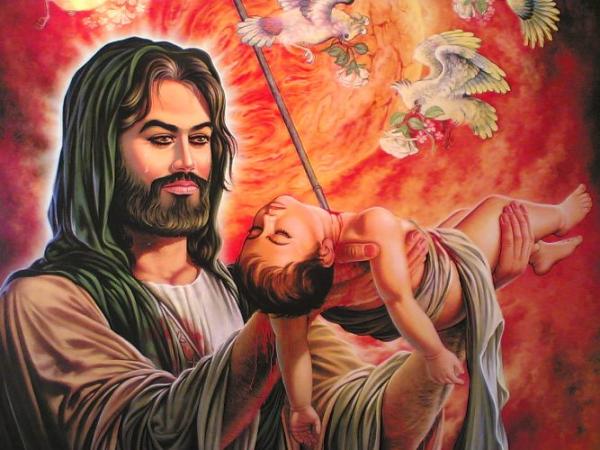


13 comments
Muhammad Hammad Zafar
I would say amazing when Caliph Hazrat Abu Bakar, was appointed as caliph and then Caliph Umar who ruled for more than 10 years and then the tragic incident Karbala took place where Hussain the Grandson of Prophet Muhammad was brutally killed. The brutality he faced and his sacrifices would be remembered.
Gabriella Parra
This is a heavily researched article with a lot of information! It’s amazing the lengths Hussain went to in order to defend his religious beliefs. It was a hopeless battle, but he fought anyway. Considering that some important Islamic figures urged him to accept Yazid as the new caliph, I wonder if Hussain could have done more had he waited and gained more support for his cause.
Yanelle Nicholson
The author of this article explains in detail everything Al Hussain went through and how he became a martyr. He tells us the entire background that led to him being killed for his religion and his people. The way the author wrote this story and used maps so we could visualize everything he explained had happened and how it happened. I found it very interesting as I had never heard of that story in the past.
Esteban Serrano
Hey Nooraldeen,
I have to say, great job on your article and congratulations on your publication. It was a very interesting article to say the least, and I really enjoyed reading it. I think you did a great job with your research, doing things such as formatting your Chicago Style footer, organizing the story and making it flow, as well as beginning and finishing the story flow on a very attention-grabbing level. Great job, once again!
Halie Estrada
This article was great! so well written and your focus on details really shined through. The article really gave a deeper look into the before and after of the massacre of Karbala. Though it ends sadly Hussain is forever going to be someone I now know of and an inspiration to never let pain and sadness bring you down.
Kayla Braxton-Young
This article was very informative and lengthy. It provided a lot of information about something I didn’t really know about. It was nice to learn about something that I didn’t know much about. I really liked how much thought was put into this article and I actually learned a lot from reading this article. This article was really good and you wrote this article well. This is a really good article about Hussain, who stood up for what he believed in despite everything that was done to him. The article was very well written and extremely detailed, and it broke down the events leading up to, during, and after the Battle of Karbala. It was a good source of information for someone who doesn’t know a lot about the prophet Muhammed.
Joshua S Marroquin
This article was very interesting to read. I learned a lot of new information which surprised me; I would also like to thank on how descriptive the article was. The author did a great job of keeping me intrigued with the passage, without losing my focus. The author also used certain images that help me better understand the story that was being told.
Ben Kruck
This is a really good article. The structure of the article was fantastic, and the use of the images was great as well. It had plenty of length as well, resulting into an article that is full of detail. It’s sad how Hussain ended up, but he always stood for what he believed in, despite everything that was done to him. That takes someone to be very strong to endure all of that.
Robert Miller
The article was very well written and extremely detailed. It really broke down the events leading up to, during, and after the Battle of Karbala, and how those events eventually led to how Islam is viewed and practiced today. I personally don’t know a lot about the prophet Muhammed or the religion of Islam, so this article was a good source of some knowledge.
Aurora Torres
Great article but very sad ending. I can’t believe that the people would kill the way they did for disobedience and anger. I love how Hussain stood by his word and did everything he did because if his faith and promise, after they killed his infant son I have no idea if I would be able to withstand that but he did for everyone and he died believing and never giving up. It takes someone very strong to deal with so much pain and I never heard of this story but I’m glad I know who this person is now.